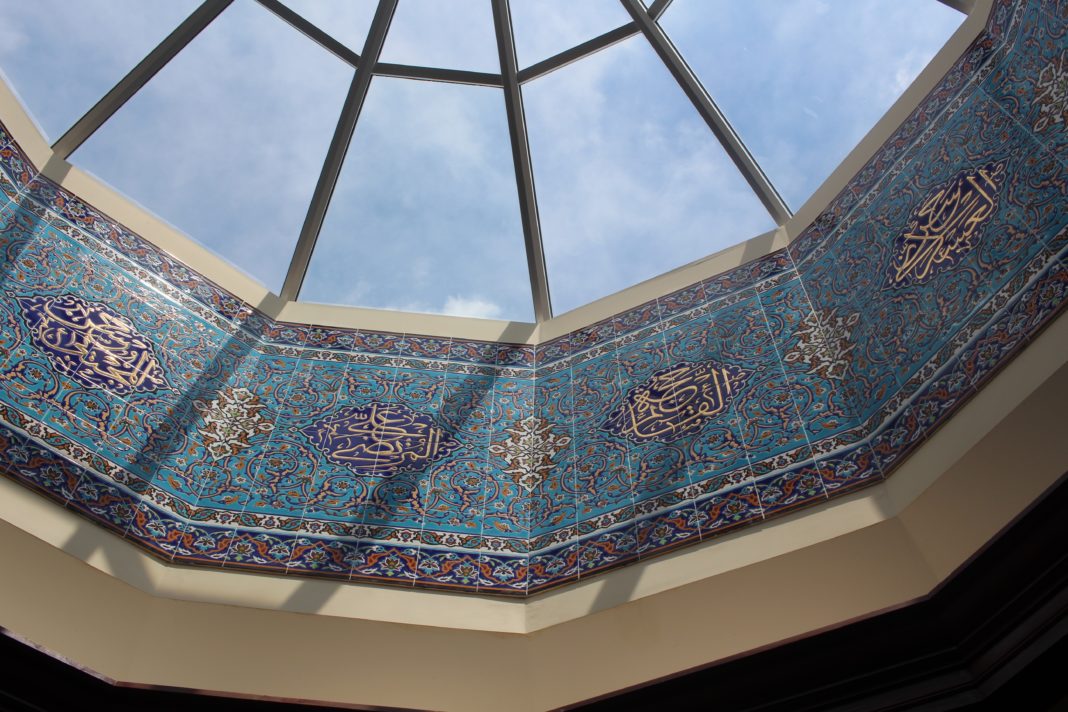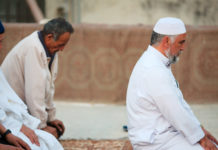بسم الله الرحمن الرحيم
اللَّهُمَّ ارْزُقْنَا تَوْفِيقَ الطَّاعَةِ وَ بُعْدَ الْمَعْصِيَةِ وَ صِدْقَ النِّيَّةِ وَ عِرْفَانَ الْحُرْمَةِ وَ أَكْرِمْنَا بِالهُدَى وَ الاسْتِقَامَةِ وَ سَدِّدْ أَلْسِنَتَنَا بِالصَّوَابِ وَ الْحِكْمَةِ وَ امْلَأْ قُلُوبَنَا بِالْعِلْمِ وَ الْمَعْرِفَةِ وَ طَهِّرْ بُطُونَنَا مِنَ الْحَرَامِ وَ الشُّبْهَةِ وَ اكْفُفْ أَيْدِيَنَا عَنِ الظُّلْمِ وَ السِّرْقَةِ وَ اغْضُضْ أَبْصَارَنَا عَنِ الْفُجُورِ وَ الْخِيَانَةِ وَ اسْدُدْ أَسْمَاعَنَا عَنِ اللَّغْوِ وَ الْغِيبَةِ وَتَفَضَّلْ عَلَى عُلَمَائِنَا بِالزُّهْدِ وَ النَّصِيحَةِ وَ عَلَى الْمُتَعَلِّمِينَ بِالْجُهْدِ وَ الرَّغْبَةِ وَ عَلَى الْمُسْتَمِعِينَ بِالاتِّبَاعِ وَ الْمَوْعِظَةِ وَ عَلَى مَرْضَى الْمُسْلِمِينَ بِالشِّفَاءِ وَ الرَّاحَةِ وَ عَلَى مَوْتَاهُمْ بِالرَّأْفَةِ وَ الرَّحْمَةِ، وَ عَلَى مَشَايِخِنَا بِالْوَقَارِ وَ السَّكِينَةِ وَ عَلَى الشَّبَابِ بِالْإِنَابَةِ وَ التَّوْبَةِ وَ عَلَى النِّسَاءِ بِالْحَيَاءِ وَ الْعِفَّةِ وَ عَلَى الْأَغْنِيَاءِ بِالتَّوَاضُعِ وَ السَّعَةِ وَ عَلَى الْفُقَرَاءِ بِالصَّبْرِ وَ الْقَنَاعَةِ وَ عَلَى الْغُزَاةِ بِالنَّصْرِ وَ الْغَلَبَةِ وَ عَلَى الْأُسَرَاءِ بِالْخَلاصِ وَ الرَّاحَةِ وَ عَلَى الْأُمَرَاءِ بِالْعَدْلِ وَ الشَّفَقَةِ وَ عَلَى الرَّعِيَّةِ بِالْإِنْصَافِ وَ حُسْنِ السِّيرَةِ وَ بَارِكْ لِلْحُجَّاجِ وَ الزُّوَّارِ فِي الزَّادِ وَالنَّفَقَةِ وَاقْضِ مَا أَوْجَبْتَ عَلَيْهِمْ مِنَ الْحَجِّ وَ الْعُمْرَةِ بِفَضْلِكَ وَ رَحْمَتِكَ يَا أَرْحَمَ الرَّاحِمِينَ.[1]
Oh God, bestow upon us the grace of obedience, and distance from sin, the trueness of intention, and knowledge of what is sacred. Honor us with guidance and perseverance; direct our tongues towards truth and wisdom; fill our hearts with knowledge and deep comprehension; purify our bodies from sinful foods and uncertain foods, stay our hands from injustice and theft, close our eyes to immorality and disloyalty, and stop our ears from vanity and gossip. Confer renunciation and good counsel upon our scholars, and hard work, enthusiasm and care upon our students; obedience and exhortation upon our congregations; healing and ease upon sick Muslims; clemency and mercy upon the deceased among them; dignity and serenity upon our old; contrition and penitence upon our youth; modesty and chastity upon our women; humility and abundance upon the wealthy; patience and contentment upon the poor. (Confer) aid and triumph to our warriors, freedom and ease upon our prisoners, justice and sympathy to our leaders; fairness and good conduct upon our subjects. Bless our hajj-pilgrims and (other) pilgrims with their provisions and their expenses; and discharge the hajj and ʿumrah you made mandatory upon them, by your Bounty and Mercy, O you who are the Most Merciful.
This prayer, associated with Imam al-Mahdi, tells us of goodness and virtue in a holistic way, bringing together individual and social virtues in a unique and comprehensive manner. In honor of ʿĪd al-Aḍḥā, let us reflect on two of its major themes, in hopes of inculcating at least some of these virtues in ourselves.
The prayer begins by setting the stage for any and all prayers to be effective: recognizing the privilege and grace that comes from God. Our journey towards goodness begins as a grace of God, who created us, sustains us, and bestowed us with the criteria and the existential push towards goodness—the motivation to strive to perfection. This is God’s primordial grace. It is the grace in which our very being, on all levels of our existence, is in the hands of God and depends on his Favor. Divine grace is the string that connects and unites our entire existence, just as the thread that binds together the prayer beads: it runs throughout each moment of our existence and every virtue we ask God for. There is a line from Saʿdi, the Persian poet, that echoes this message:
هر نفسی که فرو می رود ممدّ حیاتست و چون بر می آید مفرّح ذات پس در هر نفسی دو نعمت موجودست و بر هر نعمتی شکری واجب.[2]
“Every breath that is taken extends life. As it leaves, it heartens the soul. So, within every breath two blessings endure. And for every blessing thanks is due.”
Gratitude is indeed a continuous and never-ending process. However, our gratitude must be at a higher level. It isn’t just a never-ending process, meaning one that continues through time. Rather, we receive various degrees and levels of blessings and grace. God has graced us existentially; He has graced us with continuous sustenance. He graced us with the means of understanding Him, and of thanking Him—the grace of cognition, and particularly, of the primordial cognition of Him. Then, there is His historical grace, wherein he revealed to us the Prophet and the Imams, those lights who show us the doors to true servitude, sincere gratitude, and utter obedience, and who permit us to reach the pinnacles of virtue. Therefore, for “every blessing” should not be understood linearly, meaning that we recognize His blessings in this or that moment. Rather our recognition must be multiplied by the many levels of blessings that each moment contains within itself.
In addition, we depend on God to continue His grace upon us at every single moment; God graces us with existence, and with continued existence; He graces us with cognition and with continued cognition; He graces us with cognition of Him and with a continued cognition of Him. He graces us with means to thank Him and a continued ability to thank Him. Each of these blessings extends to each of His creatures, who are in turn blessings in themselves. And this prayer calls us to see this continuous thread of God’s grace throughout our existence and at its various levels, that God “bestows” us—the Arabic رزق—with His “grace”—the Arabic توفيق—in all of the following enumerations of his blessings, and all the additional blessings that we pray to Him for.
Imam ʿAlī was once asked the meaning of the first verse of Sūrah al-Fātiḥah. He responded:
هو أن الله عرّف عباده بعض نعمه عليهم جملاً إذ لا يقدرون على معرفة جميعها بالتفصيل لأنها أكثر من أن تحصى أو تعرف فقال قولوا الحمد لله على ما أنعم به علينا[3]
“It is that God informed His servants of some of His blessings upon them, and in a general way. For his servants cannot ever come to know all of those blessings in detail, because they are greater than can be enumerated or known.” Then he said, “Say, ‘Praise is due to God for all that He has blessed us with.’”
So one aspect of speaking to God is to thank Him for the blessings He has given us in the past and present.
And yet this prayer isn’t about foregone blessings; it is a prayer to increase those blessings. It is a prayer for God to bestow upon us two different levels of virtues: the first, virtues that are universal, that all people must cultivate within themselves to be good. These are human virtues that unite us and apply to all people. We must all recognize God, worship Him, and obey His commands and wishes. We must all try to attain true and sincere intentions. We must all fill our hearts with knowledge, regardless of whether we are students or teachers, young or old. And since goodness requires a distance from evil, the Imam prays for this distance. After all, one cannot be good and simultaneously be close to evil. We must all strive to be guided, and to protect our bodies and selves from all evil as we strive for the ultimate good.
It is noteworthy that the prayer seemingly fluctuates between acquiring our individual virtues and reminding us of the ultimate goals of those virtues. It reminds us of the importance of both the acts and the process of obedience. It asks for guidance, but also for being steadfast in guidance. And it goes through each individual resource that God has given us to attain the goals of guidance and understanding: our tongues, eyes, ears, hands, stomachs, and our hearts. It asks God to give our hearts knowledge and deep understanding, for it is the heart that is the source of life and being; it is the source of understanding.
The second part of the prayer speaks on social virtues, virtues that we must cultivate in terms of our relation to others and our various roles in society. This section has a number of different lessons. First, it tells us that the journey to a virtuous life cannot be undertaken alone. It necessarily involves and must speak to our entire being, which includes both our “selves” as individuals, and our “selves” in relation to others.
Second, the virtues enumerated for each of these relations are not the exclusive domain of that particular group. For example, the prayer asks God to grant scholars renunciation and good counsel. But these attributes are not exclusive to scholars. We must all strive to give good counsel. Similarly, we must all be enthusiastic and care about knowledge, to be modest and chaste, and content and patient. Yet in God’s infinite wisdom, He has established particular challenges and particular roles for each group within society, trials that touch and endure in the lives of particular people more than they endure in the lives of others.
An analogy can be drawn to the particular titles of the Imams: although all the Imams are ṣādiq (Truthful), we use that title to speak of Imam Jaʿfar al-Sadiq. While all are taqī (pious and God-fearing), this virtue is used when referring to only one of them. This does not diminish the importance of that virtue; in fact, it helps to emphasize it. Nor does associating the virtue with one imam limit it to that imam. Instead, it helps us understand the importance and beauty of that virtue in the person of that imam, and thus to appreciate its existence in the other imams as well. Referring to the sixth Imam as al-Ṣādiq (the Truthful), the seventh Imam as al-Kāẓim (the Forbearing), and the tenth Imam as al-Naqī (the Pure) connects us to each of these imams. It allows us to better understand each of these qualities as a unique virtue; in fact, this deeper recognition allows us to better appreciate that virtue in the other imams as well. As a result, we begin to grasp the complexity in God’s creation and reflect on the tools one needs to overcome difficulties. These virtues are those tools.
One problem that arises is that at times, one set of concerns takes primacy in our lives over all else, upsetting this delicate and divine balance. Take for example the primacy of social justice between the rich and the poor, or for example increased equality and fairness in political systems. The tension and misunderstandings that exist between rich and poor can never be eliminated entirely. But in light of this prayer, we can see that beyond this tension, there can also be a shared purpose and a deeper spirituality. Both rich and poor have been blessed and tested by Allah, but in different ways. Both have a challenge and a task to honor and obey God’s command. Both have a role to play in the betterment of society. And in the course of their lives, there might be many times when today’s rich are tomorrow’s poor, or yesterday’s receivers are today’s givers.
In addition, this prayer—which is itself a reflection of the lives and approach of our Imams—shows us that our sense of good and evil cannot be confined to one segment of our lives. Each of us simultaneously fulfills several roles and balances many different types of responsibilities. We grow up, but we are still our parents’ children. We get married, but we are still siblings to our brothers and sisters. We may move from one city to another, but we are still bound by ties of family, friendship, religion, and humanity to those we leave behind. For example, political life, although important in many ways, cannot consume the rest of life and all the other roles we play, as though it is the single thing that gives us meaning. Nor can the virtues of this role claim a hegemony over what defines virtue or truth. All of these roles are elements or loci that infuse our lives with meaning, and our understanding and being must reflect this recognition.
Finally, the prayer tells us that each of these roles, however difficult, has its own virtues. Many times, when we look at our current situation, we are prone to say, if only circumstances would have been different. We see goodness in only particular situations or results. “If we were rich, then we would be virtuous.” “If we were young, we would be good.” “If we were in power, we would be fair and just.” Yet this prayer shows us that each one of these circumstances has its own virtues and we must strive towards the particular virtue embedded in those circumstances. Our particular situation should not negate our journey towards goodness. If we find ourselves in poverty, we must be patient and content; just as if we find ourselves with wealth, we must be humble and generous. If we are subjects of a government, we must be fair and have good deeds. If we are old, we should strive towards dignity and serenity. If we are young, we need to ask for forgiveness and repent to God more often.
Of course that does not mean it is equal to be young and to be old, or to be poor and to be rich. Wealth is a blessing that God gives to some people that he does not give to others. We shouldn’t fool ourselves into thinking that it isn’t good. Or to say that youth is bad or is equal to being old. Imam Husayn, describes this reality in his Duʿāʾ ʿArafah. Two brothers, Bishr and Bashir, sons of Ghalib al-Asadi narrate the story behind this duʿāʾ:
“On the afternoon of the day of ʿArafah, Imam Husayn exits his tent surrounded by his some of his family members, his sons, and his Shiʿah. The Imam was in a state of utter humility and abasement of his self, as he went to the left flank of the mountain. He then turned towards the Kaʿbah, and raised his hands as a beggar who pleads for food.” The Imam states in his prayer:
أَشكو إليكَ غربتي وبُعد داري وهَواني على من ملَّكْتَهُ أَمري إلهي فلا تُحلِلْ عليَّ غَضَبَكَ فَإِنْ لم تَكُن غَضِبتَ عليَّ فلا أُبالي سِواكَ سُبحانَكَ غَيرَ أنَّ عافيتكَ أوسع لي فأسئلكَ يا ربِّ بنور وجهك الَّذي أشرَقَتْ له الأرضُ والسمواتُ وكشفت به الظلمات وصَلَحَ به أمرُ الأولين والآخِرين أن لا تُميتَني على غَضَبِكَ ولا تُنْزِلْ بي سَخَطَكَ
I complain to You about my alienation and my foreignness, and my ignominy in the eyes of him whom You have given domination over me. So, O my God, do not make Your wrath come upon me. If You are not wrathful with me, then I care for nothing save You. All glory be to You; yet, Your granting me well-being is more favorable for me. So, I beseech You, O my Lord, in the name of the Light of Your Face, to which the Earth and the heavens have shone, by which all darkness has been uncovered, and by which the affairs of the past and the coming generations are made right, (please) do not cause me to die while You are wrathful with me, and do not inflict on me Your rage.[4]
The Imam tells us that although we recognize and accept God’s decree for us, we also pray to Him wholeheartedly for deliverance. Once we have attained God’s satisfaction, all the blessings He showers us with will be just that, blessings. If, however, we have the wrath of God upon us, then all such blessings are transformed into sources of punishment.[5] And so we must keep that ultimate criterion in mind when we face our own lives. We must remember that each circumstance that God has placed us in has its own virtue. And rather than always striving to change the particular circumstances God give us, we should concern ourselves more with how we acquire that Divine Pleasure. And having recognized this, pray for further Divine grace, that string that connects each level of our existence.
بِفَضْلِكَ وَرَحْمَتِكَ يَا أَرْحَمَ الرَّاحِمِينَ
[1] Al-Kafʿamī, Al-Miṣbāḥ, pg. 280-1. All translations are by author, unless indicated otherwise.
[2] Saʿdī, “Dībācheh”, in Gulistān. Accessed September 15, 2016. http://ganjoor.net/saadi/golestan/dibache/.
[3] Al-Saduq, ʿUyūn Akhbār al-Riḍā, 1:282, hadith 30.
[4] Imam Al-Husayn, “Du’a’ Arafah”, transl. by www.duas.org, accessed: September 11, 2016. http://www.duas.org/zilhajj/arfday.htm.
[5] For a verse that indicates that blessings can transform into sources of further punishment, see: Qurʾan, Sūrat ul-Qalam 68:44-5.




